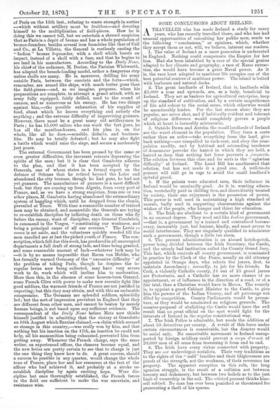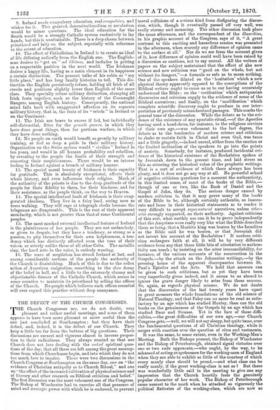SOME CONCLUSIONS ABOUT IRELAND TRAVF.T.T.ER who has made Ireland a
study for many years, who has recently travelled there, and who has had unusual opportunities of consulting her public men, sends us the following "conclusions," or opinions, which, whether they accept them or not, will, we believe, interest our readers.
1. The value of Ireland as a mere possession is underrated in England. Nothing could compensate the Empire for her loss. Had she been inhabited by a race of the special genius adapted to her climate and geography, a race of None extrac- tion, she would have become a great Naval power. As it is, the race least adapted to maritime life occupies one of the best potential centres of maritime power. The island is belted with harbours and natural docks.
2. The great landlords of Ireland, that is, landlords with £5,000 a year and upwards, are, as a body, beneficial to Ireland. They act as bankers for agricultural enterprise, keep up the standard of cultivation, and by a certain magnificence of life add colour to the social scene, which otherwise would be unendurably leaden. For the last reason alone they are popular, are never shot, and if habitually resident and tolerant of religious difference would completely govern a people which at heart is incurably aristocratic.
3. Outside Down and Antrim the small landlords of Ireland are the worst element in the population. They form a caste
rather than an order—take everything from the land, give back nothing—are compelled to rack-rent, and obey the com- pulsion readily, and by habitual and astounding insolence of demeanour provoke the hatred in which they are held, a
hatred so deep that nothing but force prevents a jacquerie. The relation between this class and its serfs is the " agrarian
difficulty" of Ireland. The Land Bill has ameliorated that relation, but has not made it a good one. A well-to-do peasant will still go in rags to avoid the small landlord's spiteful greed.
4. If the priests were educated men, their influence in Ireland would be unmixedly good. As it is, wanting educa- tion, wretchedly paid in shilling fees, and discreditably treated by society, their one enjoyment is the possession of power. This power is well used in maintaining a high standard of morals, badly used in supporting obscurantism against the wishes of the people, who hunger and thirst for education.
5. The Irish are obedient to a certain kind of government in an unusual degree. They need and like Indian government,
—that is, a government by a trained and centralized bureau- cracy, inexorably just, but lenient, kindly, and most averse to social interference. They are singularly qualified to administer such a government, though a little too stern.
6. The present administration is an absurd hotch-potch, power being divided between the Irish Secretary, the Castle, and the utterly bad institution called the County Grand Jury.
This last, which controls all county government, is nominated in practice by the Clerk of the Peace, usually an old attorney
appointed in Orange days, who selects the jurors, first, to
maintain Ascendancy ; secondly, to job for his friends. In Cork, a violently Catholic county, 24 out of 25 grand jurors are Protestants, and a Catholic has no more chance of an appointment, or of influence in the direction of a road, or of a fair trial, than a Christian would have in Mecca. The remedy is, to appoint a great Cabinet Minister to the Castle, to give him the powers of the Indian Viceroy, and all patronage not filled by competition. County Parliaments would be prema- ture, as they would be nominated on religious grounds. The counter-proposal of abolishing the Castle would have the evil result that no great official on the spot would fight for the interests of Ireland in the regular constitutional way.
7. The Irish Police is admirable, but needs the addition of about 50 detectives per county. A revolt of this force under
certain circumstances is conceivable, but the disaster would be social only. No conceivable movement in Ireland unsup- ported by foreign artillery could prevent a cops darme'e of 20,000 men of all arms from traversing it from end to end.
8. The Irish have every virtue connected with property.
They are not undeveloped socialists. Their very traditions as to the rights of the " ould" families and their litigiousness are proofs of the strength, not the weakness, of their reverence for property. The apparent exception to this rule, the long agrarian struggle, is the result of a collision not between honesty and dishonesty, but between two beliefs as to the just limit of ownership in the soil. The evicted peasant thinks him- self robbed. No man has ever been punished or threatened for prosecuting a theft of his spoons. 9. Ireland needs compulsory education, real compulsion, and wishes for it. This granted, denominationalism or secularism would be minor questions. The ideal education for the South would be a strongly Catholic system exclusively in lay hands, but this is unattainable. There is a deep chasm between priesthood and laity on the subject, especially with reference to the extent of education.
10. The effect of Catholicism in Ireland is to create an ideal of life differing radically from the English one. The English- man desires to "get on" ad libitum, and includes in getting on a respectable position in the next world. The Irishman desires a happy life, having as a main element in its happiness a certain distinction. The peasant talks of his cabin as "my little place," and has long family histories to tell. This dis- tinction the English persistently refuse, holding all Irish of all creeds and positions slightly lower than English of the same class. They specially refuse military distinction, slumping all Irish feats together, such as the history of the Connaught Rangers, among English history. Consequently, the national mind falls back with exaggerated affection on its separate military history, that is, the feats of its " rebels " in Ireland or on the Continent.
11. The Irish are brave to excess if led, but individually self-distrustful, fitter for the grande guerre, in which they have done great things, than for partizan warfare, in which they have done nothing.
12, No people on earth would benefit so greatly by military training, or feel so deep a pride in their military history. Organization on the Swiss system would " civilize " Ireland in ten years, and would in all human probability end rebellion, by revealing to the people the limits of their strength and removing their suspiciousness. There would be an intense feeling in Ireland against a breach of military honour.
13. The special moral beauty of Irishmen is their capacity for gratitude. This is absolutely exceptional, affects their whole history, and even influences their religion. Much of the authority of the priests is due to the deep gratitude of the people for their fidelity to them, for their kindness, and for their assistance, as the people think, on the way to Heaven.
14. The special intellectual fault of Irishmen is their exag- gerated idealism. They live in a fairy land, seeing men as trees walking. They will rage at telegraph clerks because the telegrams are disagreeable. This is the root of their apparent mendacity, which is not greater than that of some Continental peoples.
15. The most marked external intellectual feature of Ireland is the plaintiveness of her people. They are not melancholy, or given to despair, but they have a tendency, as strong as a passion, to pity themselves for their own helplessness, a ten- dency which has distinctly affected even the tone of their voices, so utterly unlike those of all other Celts. The metallic ring, the hard note in the voice, is entirely wanting.
16. The wave of scepticism has struck Ireland at last, and among considerable sections of the people the authority of the Church is diminishing. Much of this is due to the reflex action of American emigration, something to the slow decay of the belief in hell, and a little to the extremely clumsy and objectionable finance of the Catholic Church, which seems in some counties to maintain its priesthood by selling the offices of the Church. No people which believes such offices essential will ever regard this practice without deep annoyance.































 Previous page
Previous page